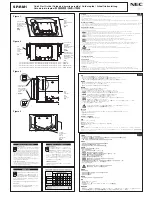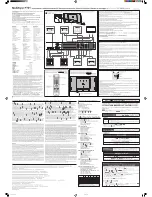
31
Risk indicator:
The measurements can be classified and evaluated in accord-
ance with the following table.
However, these standard values serve only as a general guide-
line, as the individual blood pressure varies in different people
and different age groups etc.
It is important to consult your doctor regularly for advice. Your
doctor will tell you your individual values for normal blood pres-
sure as well as the value above which your blood pressure is
classified as dangerous.
The classification on the display and the scale on the unit show
which category the recorded blood pressure values fall into. If
the values of systole and diastole fall into two different catego-
ries (e.g. systole in the “High normal” category and diastole in
the “Normal” category), the graphical classification on the de-
vice always shows the higher category; for the example given
this would be “High normal”.
Blood pressure
value category
Systole
(in mmHg)
Diastole
(in mmHg)
Action
Grade 3:
severe
hypertension
≥ 180
≥ 110
seek medical at-
tention
Grade 2:
moderate
hypertension
160 – 179 100 – 109
seek medical at-
tention
Grade 1:
mild
hypertension
140 – 159 90 – 99
regular monitoring
by doctor
Blood pressure
value category
Systole
(in mmHg)
Diastole
(in mmHg)
Action
High normal
130 – 139 85 – 89
regular monitoring
by doctor
Normal
120 – 129 80 – 84
self-monitoring
Optimal
< 120
< 80
self-monitoring
Source: WHO, 1999 (World Health Organization)
Measuring the resting indicator (using the HSD diagnosis)
The most frequent error made when measuring blood pressure
is taking the measurement when not at rest (haemodynamic
stability), which means that both the systolic and the diastolic
blood pressures are distorted.
While measuring the blood pressure, the device automatically
determines whether you are at rest or not.
If there is no indication that your circulatory system is not suf-
ficiently at rest, the symbol
(haemodynamic stability) lights
up green and the measurement can be recorded as a reliable
resting blood pressure value.
GREEN: Haemodynamic stability
Measurement of the systolic and diastolic pressure is in-
creased when the circulatory system is sufficiently at rest and
is a very reliable indicator of resting blood pressure.
However, if there is an indication that the circulatory system is
not sufficiently at rest (haemodynamic instability), the symbol
lights up red.
In this case, the measurement should be repeated after a pe-
riod of physical and mental rest. The blood pressure measure-
ment must be taken when the patient is physically and mentally
Summary of Contents for BM 85
Page 118: ...118 6 2 BF WEEE Waste Electrical and Electronic Equipment 21 PAP Storage Transport Operating...
Page 119: ...119 SN CE 93 42 EEC 30...
Page 120: ...120 3...
Page 121: ...121 WEEE Waste Electrical and Electronic Equipment...
Page 122: ...122 3 1 2 3 4 5 USB 6 7 M1 M2 8 9 10 11 1 2 3 4 10 9 5 11 6 7 8...
Page 124: ...124 4 USB USB USB USB Bluetooth Pb Cd Hg Bluetooth Bluetooth M1 M2 5 M1 M2 M1 M2 M1 M2...
Page 126: ...126 OK 22 42 3...
Page 128: ...128 6 5 3 180 110 2 160 179 100 109 1 140 159 90 99...
Page 129: ...129 130 139 85 89 120 129 80 84 120 80 WHO 1999 World Health Organization 5...
Page 130: ...130 7 60 3 M1 M2 M1...
Page 131: ...131 M2 Bluetooth M1 M2 1 M1 2 M2 A AM 7 5 00 9 00 M1 M2 PM 7 18 00 20 00...
Page 137: ...137 14 22 42 163 946 071 62 USB 163 484 15...
Page 158: ...158...
Page 159: ...159...
















































